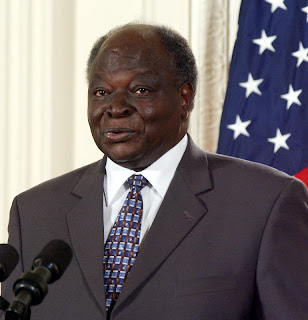By Jerry Okungu
Nairobi, Kenya
May 20, 2010
The founding father of modern Kenya; Jomo Kenyatta spent nearly three decades agitating for Kenya’s freedom both at home and abroad. Nine of those years were spent in prison having been wrongly convicted of being a Mau Mau mastermind along with his six other colleagues we commonly refer to as the Kapenguria Six. In all those years, Kenyatta suffered several humiliating insults, doing odd jobs in England and even marrying a white woman to make ends meet in the chilly weather of the United Kingdom. At the time of his imprisonment in 1952, the then colonial authorities described him as a leader unto darkness and death. To the colonial governor, he was the epitome of evil that deserved to die in prison.
The behavior of Kenyatta upon his release was to be repeated by Nelson Mandela 30 years later when the latter finally emerged from Robben Island after 27 years of incarceration. Like Jomo, Mandela forgave White supremacists that had jailed him and joined hands with the then South African President, W De Clark to form the first multiracial government in South Africa after nearly 400 years of White domination.
Just next door in Uganda, those who received political leadership on a silver platter like Presidents Lule, Binaisa and Tito Okello did not last. They had not suffered enough in the quest for that high office in order to develop staying power. They all got swept by the wayside by radicals of their time. The only reason why Museveni has ruled Uganda this long is because he spent almost 10 years in the bush fighting against regimes that had plundered Uganda since the beginning Of Idi Amin’s rule.
When Daniel Moi took power in Kenya in 1978 upon Kenyatta’s death, he had served in Kenya’s parliament in different capacities for 26 years. 14 of those years were spent either as a cabinet minister in charge of internal security or as Kenyatta’s Vice President for 12 years, a period that was instrumental in nurturing him as a national leader.
However, perhaps the most trying moments for Moi in those years were when he served as Kenyatta’s principal assistant. It was during that time when he endured many insults from his juniors that believed that he wasn’t the right person to succeed Kenyatta. The assault on his character and authority included being barred from seeing Kenyatta by the clique around the President, failure by some ambassadors to show up at European airports to meet him and the open campaign to change the constitution in 1976 ostensibly to block him from succeeding Kenyatta upon the latter’s demise. But because he had developed a thick skin and was a patient man, he finally succeeded Kenyatta and ruled Kenya for a good 24 years.
Before Mwai Kibaki succeeded Moi in 2002, he had been in politics for 42 years 39 of those in the cabinet in various capacities under Jomo Kenyatta and Daniel arap Moi. It is also instructive to note that he served Moi as Vice President for 10 good years, a position that usually attracts myriad attacks in Kenyan politics from competing political forces. When finally he was dropped as Moi’s Vice President following the flawed mlolongo elections of 1988, pundits were quick to write him off.
Although Kibaki stayed on in Moi’s cabinet as Health Minister from 1989 to 1991, it was when he resigned from Moi’s government in December 1991 to form his DP party that he seriously embarked on a long hard road to the presidency that lasted 10 good years and two lost elections. And had Moi not goofed on Uhuru Kenyatta as his successor, Kibaki would most likely not have seen the presidency in his life time.
Given the scenarios above, it may seem like all those Kenyans aspiring to be president without the credentials of political persecution, torture, humiliation or even sheer physical and psychological sacrifices may have to wait a little longer before they become tenants of the State House in the Milimani suburbs of Nairobi. This could be the reason Kibaki could not win the presidency soon after resigning from the Moi cabinet. The same could inform the reason why Uhuru Kenyatta lost the presidency despite state backing in 2002. Kenyans felt they had not suffered enough to deserve the high office.
As we prepare for Kibaki’s exit in the next two years, the front runners for this coveted office; George Saitoti, Martha Karua, Kalonzo Musyoka, William Ruto, Moses Wetangula and others would do well to go back to the drawing board to reexamine their credentials to find out if they have suffered enough for this country to deserve being at State House. If the answer is positive for them then they should be free to enter the race; if not, they are better off holding their horses for now.




0 comments:
Post a Comment